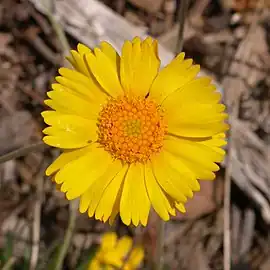Tetraneuris acaulis
Tetraneuris acaulis is a North American species of flowering plants in the sunflower family.[1][2][3][4][5][6][7] Common names include angelita daisy,[8] stemless four-nerve daisy,[9] stemless hymenoxys,[4] butte marigold,[10] and stemless rubberweed.[10]
| Tetraneuris acaulis | |
|---|---|
.jpg.webp) | |
| Scientific classification | |
| Kingdom: | Plantae |
| Clade: | Tracheophytes |
| Clade: | Angiosperms |
| Clade: | Eudicots |
| Clade: | Asterids |
| Order: | Asterales |
| Family: | Asteraceae |
| Genus: | Tetraneuris |
| Species: | T. acaulis |
| Binomial name | |
| Tetraneuris acaulis | |
| Synonyms | |
|
Synonymy
| |
Description
Tetraneuris acaulis is a highly variable perennial herb[2] which may be quite tiny to over 60 centimeters (2 feet) in height. The erect flowering stems are surrounded by basal leaves.[11] The leaves are up to 7.5 cm (3 in) long,[11] hairy or hairless, and glandular or without glands. In outline the leaves of T. acaulis vary from spoon shaped, wider at end and narrow at the base (spatulate), still wider near the end but narrower overall and much longer and wide (oblanceolate), to almost narrow like grass, though still slightly widened near the end (linear-oblanceolate).[12]
It flowers from June to September.[11][4][5] There may be few or many flower heads borne singly on hairy stalks. The base of each flower head is up to 1.6 cm (5⁄8 in) wide. The head contains 8 to 21 yellow ray florets each up to 2 cm (3⁄4 in) long. At the center are many yellow disc florets, sometimes 200 or more. The fruits are dry achenes only a few millimeters long.[7] Some plants may have no ray florets.[11]
.jpg.webp) Close-up of basal leaves
Close-up of basal leaves.jpg.webp) Side view of flowers
Side view of flowers Flower close-up
Flower close-up
Varieties
It is generally accepted that there are four varieties of this species:[7][13]
- Tetraneuris acaulis var. acaulis: stemless four-nerve daisy – Alberta, Saskatchewan, Colorado, Idaho, Kansas, Montana, Nebraska, New Mexico, North Dakota, Oklahoma, South Dakota, Texas, Wyoming, Chihuahua, Zacatecas
- Tetraneuris acaulis var. arizonica: Arizona four-nerve daisy – Arizona, California, Colorado, Idaho, Nevada, Utah
- Tetraneuris acaulis var. caespitosa: caespitose four-nerve daisy – Colorado, New Mexico, Wyoming
- Tetraneuris acaulis var. epunctata: stemless four-nerve daisy – Colorado, Utah, Wyoming, Coahuila
- Tetraneuris acaulis var. nana: stemless four-nerve daisy – Utah[9][14][15][16]
Distribution and habitat
The species is widespread across much of the western and central United States, west-central Canada (Alberta, Saskatchewan) and northern Mexico (Chihuahua, Coahuila, Zacatecas).[17][4][13] It grows in a variety of habitat types in foothills and subalpine regions,[5] and high prairie, badlands,[4] and plains.[2]
Uses
Tetraneuris acaulis has been used as a traditional medicinal plant. The Hopi used a poultice of the plant to relieve hip and back pain in pregnant women, and to make a stimulating drink.[18]
References
- Tetraneuris acaulis. ITIS.
- Tetraneuris acaulis Lady Bird Johnson Wildflower Center, University of Texas.
- Hymenoxys acaulis. The Jepson Manual, University of Calilfornia
- Hymenoxys acaulis Archived 2013-02-02 at the Wayback Machine. United States Geologic Survey, Native Wildflowers of the North Dakota Grasslands.
- Tetraneuris acaulis. Southwest Colorado Wildflowers.
- Tetraneuris acaulis. CalFlora taxon report, University of California
- Tetraneuris acaulis. Flora of North America.
- Arizona Municipal Water Users Association, Low Water-use Plants
- Tetraneuris acaulis. United States Department of Agricultgure Plants Profile
- Tetraneuris acaulis. Canadensys.
- Spellenberg, Richard (2001) [1979]. National Audubon Society Field Guide to North American Wildflowers: Western Region (rev ed.). Knopf. p. 381. ISBN 978-0-375-40233-3.
- Bierner, Mark W.; Turner, Billie L. (6 November 2020). "Tetraneuris acaulis - FNA". Flora of North America. Retrieved 16 July 2023.
- SEINet, Southwestern Biodiversity, Arizona chapter photos, description, distribution map
- Tetraneuris acaulis. Tropicos
- Welsh, Stanley Larson. 1993. Rhodora 95(883/884): 398–399 diagnosis in Latin, commentary in English
- Welsh, Stanley Larson. 1993. Rhodora 95(883/884): Plate 1, figure 5 line drawing of Tetraneuris acaulis var. nana
- Biota of North America Program 2014 county distribution map
- Tetraneuris acaulis'. University of Michigan, Dearborn, Native American Ethnobotany Database.
External links
 Media related to Tetraneuris acaulis at Wikimedia Commons
Media related to Tetraneuris acaulis at Wikimedia Commons
